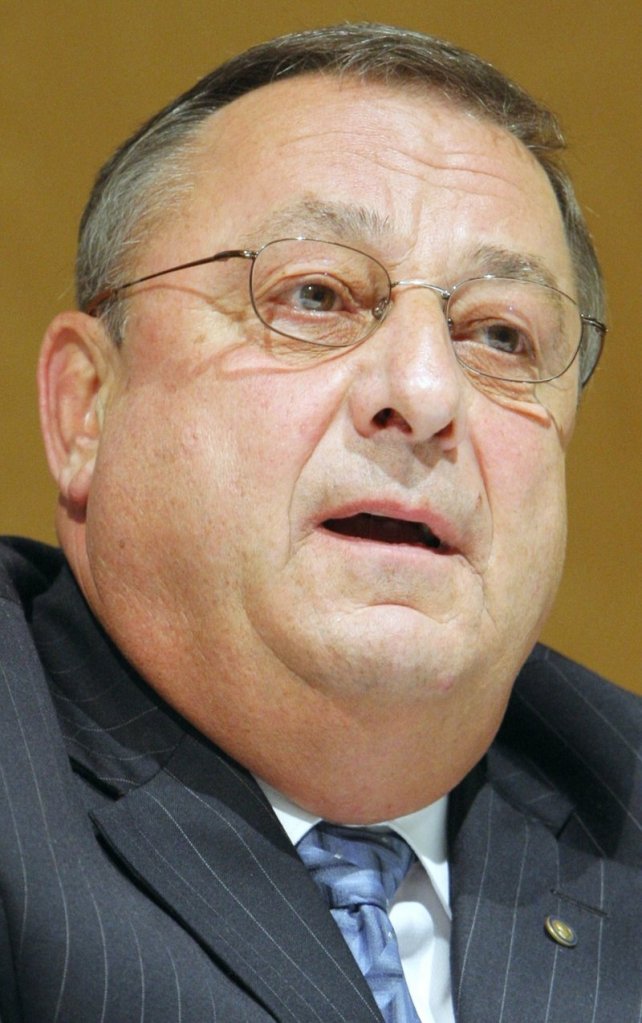AUGUSTA – Will he? Won’t he? And why?
Two days after Gov. Paul LePage told a Republican audience that he was thinking of introducing a groundbreaking and divisive initiative during a special legislative session, answers to those questions began to surface.
The LePage administration remained silent about the initiative, word of which leaked when a liberal blogger posted a recording of LePage’s comments Wednesday in Bangor.
However, leaks about the contents of the proposal began emerging Friday.
WABI-TV in Bangor, quoting anonymous sources, reported that the governor hopes to use money from the state’s wholesale liquor contract to help pay down its debt to hospitals. A spokesman for the Maine Hospital Association confirmed to the Portland Press Herald that his organization has been discussing such a plan.
It’s still uncertain whether the governor will call lawmakers to a special legislative session this year or next.
House Minority Leader Emily Cain, D-Orono, said LePage told her Friday that he will wait until January to introduce his plan. The governor’s office, however, said LePage is keeping his options open.
Jeff Austin, a spokesman for the Maine Hospital Association, confirmed Friday that his organization has been talking with the LePage administration about ways to pay down the debt.
Maine hospitals are owed $450 million to $500 million, about two-thirds of which is federal debt. The state owes $150 million to $190 million, according to Austin. The debt is from unpaid Medicaid reimbursements that began accumulating in 2009.
Austin said the administration is still formulating a plan, but the one it’s considering would tap revenue from the state liquor contract.
“We don’t have a firm proposal or anything we could take to the board of directors,” Austin said. “But we’re glad the administration understands the importance of addressing the state’s debt to the hospitals.”
In 2004, the state signed a 10-year contract for the Maine Beverage Association to be the wholesale distributor of liquor statewide. That brought in $125 million that was used to balance the state’s budget.
The contract will be renegotiated in 2013, and the state is angling for a larger percentage of the revenue from liquor sales. It’s unclear why the administration would consider calling a special legislative session a year before the negotiations.
Cain, through her spokeswoman, confirmed that she spoke briefly with the governor Friday about his plans to call a special legislative session before the Nov. 6 elections.
Jodi Quintero, Cain’s spokeswoman, said the governor indicated that he would not call the Legislature back for a special session.
Quintero said that LePage would wait until January to propose his idea, and that he would not disclose the policy initiative he had planned.
Quintero said Cain was relieved to hear that the governor had backed away from his secret plan.
But Adrienne Bennett, LePage’s spokeswoman, said the governor had a “different recollection” of his discussion with Cain and had not ruled out a special session.
“My understanding is that the governor’s conversation with Representative Cain was a private conversation,” Bennett said. “What she’s put out there is not his recollection of the conversation. It’s unfortunate that Representative Cain went directly to the media and tried to use this to her advantage.”
The governor has promised that his plan will “push the envelope” and rile Democrats.
If the liquor contract money can be used to pay off the debt to hospitals, the LePage administration could gain leverage in the debate over the Medicaid expansion proposed in the federal health care law.
The Maine Hospital Association has not officially weighed in on the Medicaid expansion. However, at the national level, hospitals are expected to support the expansion because Medicaid reduces the amount of uncompensated care — health care costs that hospitals absorb because people can’t or won’t pay.
Data published by the American Hospital Association shows that uncompensated care soared from a total of less than $4 billion in 1980 to nearly $40 billion in 2010.
A recent report by the Press Herald showed that uncompensated care provided by Maine hospitals has more than doubled over the last five years, from $94 million to $194 million.
Austin said in June that uncompensated care is a “significant burden, but it’s just not fever-pitch like it is in states” with restrictive Medicaid eligibility.
He said increased Medicaid eligibility would decrease costs for uncompensated care, but hospitals often end up paying for expanded Medicaid programming through reduced federal reimbursements.
The governor has declined to take a position on the Medicaid expansion, but his cuts to the MaineCare program in the most recent budget — and his standoff with the federal government over the legality of those cuts — suggest he would rather not increase eligibility for low-income Mainers.
LePage made vague references to his plan during a Republican fundraiser in Bangor on Wednesday. His comments were recorded by someone at the event and posted by the liberal blogger Mike Tipping.
Republican leaders said the governor’s plans were news to them. Democrats said that any significant policy change should be vetted in public, not secrecy.
In the recording, LePage says he can’t disclose the purpose of the special session or when it would happen. He says other Republican-led states have done what he plans to propose, and the attorney general is reviewing whether “I’m doing it right.”
He says Republicans will have to do it on their own. “I think we can get it done in about a day, and the Democrats, if you think they hate me now … Wow,” he says.
Democrats have historically supported Medicaid and expanding the program.
Staff Writer Steve Mistler can be contacted at 791-6345 or at:
smistler@mainetoday.com
twitter/stevemistler
Send questions/comments to the editors.



